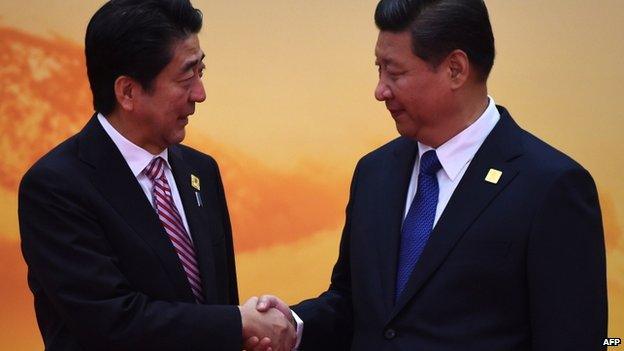China media: Awkward handshake
- Published

Papers have described the handshake between President Xi Jinping (R) and PM Shinzo Abe as "awkward"
Papers urge Japanese PM Shinzo Abe to "honour his words" after he met Chinese President Xi Jinping on the sidelines of the Asia-Pacific Economic Co-operation (Apec) summit in Beijing.
Their first meeting, which came after more than two years of severe tensions over a territorial dispute, included a public handshake with no signs of warmth.
Making brief mentions of the "awkward handshake, external", most papers have given prominent coverage to the meeting.
"The icy relations between China and Japan now appear to have finally entered the thawing season," says the Xinhua News Agency, external.
Describing the talk as "momentous", "landmark" and "of historic significance", state-run media outlets remind Tokyo that it must "honour its commitment and join China with concrete actions to fully restore the heat and vigour of bilateral ties".
"China's agreement to the meeting is a clear manifestation of Beijing's magnanimity and sagacity. Given the geographical proximity, economic intertwinement and cultural affinity between the two nations, a healthy China-Japan relationship benefits both sides," it says.
Echoing similar views, the Global Times, external notes that Mr Abe "was received with courtesy".
"Mr Xi received the Japanese leader with etiquette. Mr Abe should be clear that in Eastern culture, etiquette and commitment are closely connected. As China gives out etiquette, it also requires commitment," it says.
The paper urges Mr Abe to "remain committed to the four point agreement", and asks both countries to "respect each other and not hurt each other's feelings".
A front-page commentary in the overseas edition of the People's Daily, external, however, observes the "lack of warmth" during the handshake and explains that this reflects the reality of the icy Sino-Japan ties.
"Although the meeting is lacking in warmth, but it still carries weight as it points to the correct direction for Mr Abe... It has created a possibility for the bilateral relationship to move on the right track," adds the article.
Stressing that it is was Japan's decision to initiate the meeting, the commentary praises China for handling the arrangement with "appropriateness".
"Now that Mr Abe was granted his wish to meet with Mr Xi, what will happen next after Mr Abe left Beijing? If Tokyo observes the consensus reached, the bilateral ties will continue to improve, if not troubles will keep on coming," says the article.
US-China ties
Meanwhile, several media outlets have been discussing China-US relations against the backdrop of Mr Xi and President Barack Obama's scheduled meeting on Wednesday.
Noting that officials have released little information on the meeting's agenda, the China News Service, external expects "surprises" from the summit.
While the venue of the meeting has not been revealed, Ruan Zongze, president of China Institute of International Studies, feels that the "Xi-Obama summit" will be China's version of "Annenberg Retreat".
Mr Xi and Mr Obama had met at the Annenberg Retreat at Sunnylands in California last year. The informal setting was seen as a chance for the leaders of the world's largest economies to build rapport and seek breakthroughs in diplomacy.
The news agency states that the two leaders will focus on "the new model of major power relationship", a concept Mr Xi proposed last year.
Analysts interviewed by the Global Times, external, however, point out that the talks are "unlikely to make headway on issues such as human rights, cyber-spying and the South China Sea".
"The summit will only help manage differences between the two countries, with the US continuing to seek expanded co-operation based on its own interest," Shen Dingli, vice-dean of the Institute of International Affairs at Fudan University, tells the paper.
'Apec blue'
And finally, papers shine a spotlight on "Apec blue" - a phrase Mr Xi used in his speech on Monday.
The term was coined by beleaguered netizens in Beijing after they felt exhausted by the city's preparations to clean up the air for the summit.
"Some people call the clear Beijing skies these days the 'Apec Blue'. It's beautiful but temporary, and it will be gone soon after the Apec meeting. I hope, and believe, that with persistent efforts, the Apec blue will be here to stay," the China Radio International, external quotes Mr Xi as saying.
Defending the government's strict measure to control Beijing's air quality, an article in the Global Times' Chinese edition, external assures that the measures taken during the summit will not "return to zero" but will "benefit Beijing in the long term".
"We may not be able to keep the 'Apec blue', but we can show our strong determination. We may not satisfy all our guests, but at least we have shown that we are sincere and have put in the efforts," it says.
BBC Monitoring, external reports and analyses news from TV, radio, web and print media around the world. For more reports from BBC Monitoring, click here. You can follow BBC Monitoring on Twitter, external and Facebook, external.